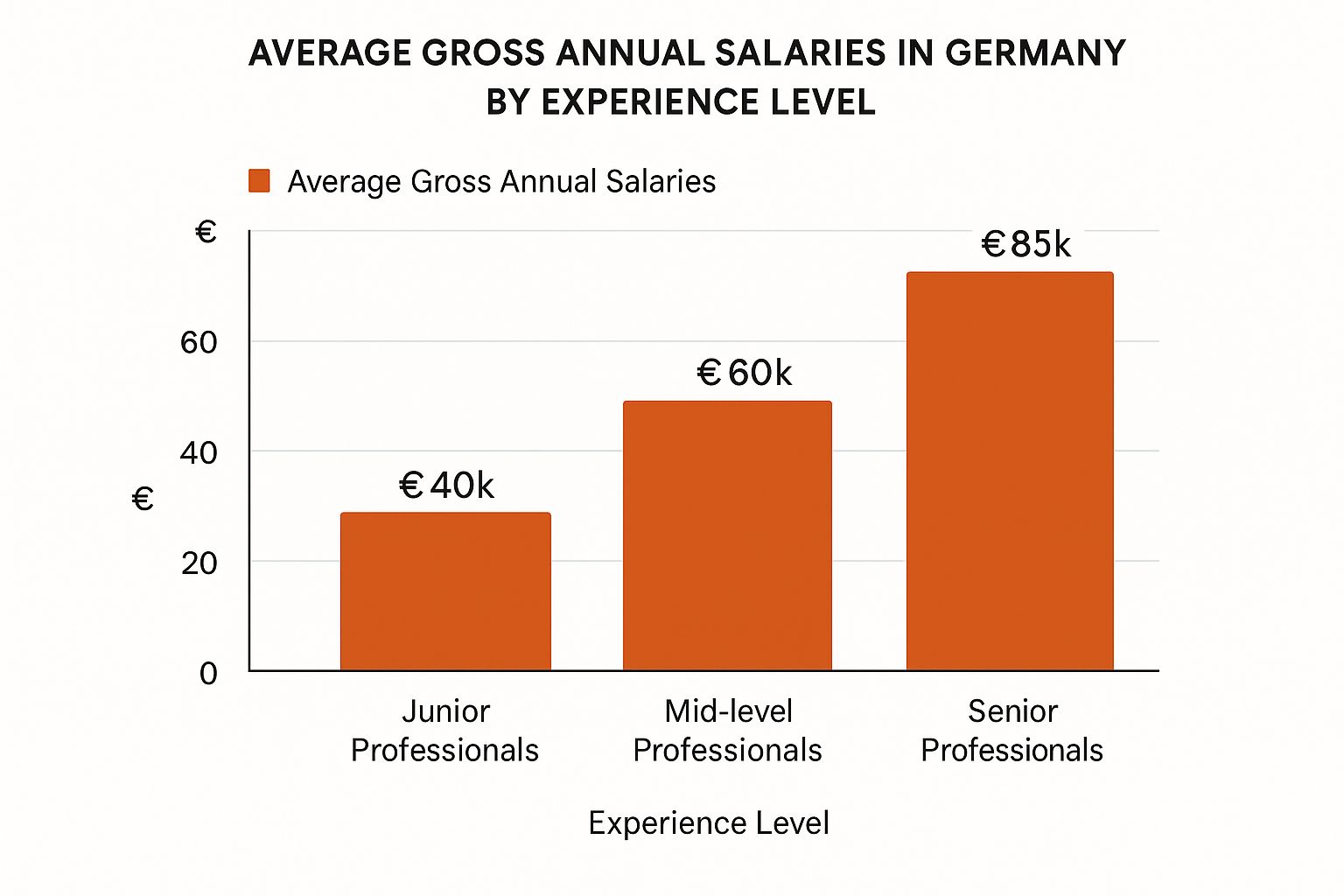Before you even think about stepping into a salary negotiation in Germany, you need to do your homework. Walking in with just a number you feel you deserve won't cut it. What you need is a solid, data-driven understanding of your market value. This isn't about wishful thinking; it's about building a case that's both realistic and impossible to ignore.
How to Determine Your Market Value in Germany
Knowing your worth is the cornerstone of a successful salary talk. The goal isn't to pluck a number from thin air, but to establish a credible salary range backed by hard facts. When you do this, you shift the entire dynamic from a tense haggle to a professional, fact-based discussion.
Having a well-researched range gives you confidence and makes you look prepared. It signals to a potential employer that you're serious, you understand the market, and you're aiming for a fair outcome.
Use German Salary Portals and Reports
Your first port of call should be the big German salary and job platforms. Websites like Kununu, Glassdoor, and Stepstone are goldmines of crowdsourced salary data. You can filter by job title, industry, and location to get a surprisingly clear picture of what people in your field are actually earning.
For a more structured perspective, look at industry-wide salary reports. These reports often provide incredibly detailed breakdowns of pay scales by region and sector. For example, the Stepstone Salary Report 2025 found that the median gross annual salary for full-time employees in Germany is around €45,800.
But here's the crucial part: location changes everything. Economic powerhouses like Hamburg and Bavaria boast median salaries well above €50,000, while other regions pay considerably less. This is why generic, nationwide averages can be so misleading.
Account for Key Salary Variables
Your job title is just one piece of the puzzle. Several other factors dramatically influence your market value, and you need to weigh them carefully to pinpoint your realistic salary range.
The table below breaks down the primary variables that determine salary levels across Germany. Use it to understand where your specific profile fits within the broader market.
Key Factors That Influence Your German Salary
| Factor | Impact on Salary | Example |
|---|---|---|
| Experience Level | High | A senior developer with 10+ years of experience will command a much higher salary than a junior with 1-2 years. |
| Company Size & Type | Medium to High | Large corporations (Konzerne) and established Mittelstand companies typically have larger budgets than startups or small agencies. |
| Location (Bundesland) | High | The cost of living and concentration of high-paying industries means a job in Munich will almost always pay more than the same role in Leipzig. |
| Your Qualifications | Medium to High | An advanced degree (Master's, PhD) or specialised, in-demand certifications can provide significant leverage for a higher salary. |
| Industry | High | Roles in industries like pharmaceuticals, automotive, or tech generally pay more than those in hospitality or the creative arts. |
These factors are interconnected and create a complex picture. For anyone new to the German professional world, getting a handle on these nuances is essential. If you're an expatriate, our guide on working in Germany as a foreigner offers deeper insights into navigating these cultural and economic specifics.
The chart below shows just how much your experience level can influence your earning potential.

As you can see, the leap from a junior to a senior position can easily double your salary. This is why accurately assessing and articulating your level of experience is so critical.
By grounding your salary expectations in verifiable data, you transform your request from a hopeful ask into a defensible business proposal. This preparation is your most powerful tool in any salary negotiation in Germany.
Crafting Your Personal Negotiation Strategy

So, you've done your homework and have a data-backed salary range. Fantastic. Now it’s time to shift gears from research to persuasion. This next step is all about building a compelling, personalised case for yourself. It’s not enough to just name your price; you need to demonstrate precisely why you're worth it.
The key is connecting your specific skills and past successes directly to the needs spelled out in the job description. Think of it as building a ‘value dossier’ on yourself. This isn't just a list of your old duties. It’s a highlight reel of your impact, packed with hard evidence. In Germany, hiring managers respond to facts and results far more than vague claims.
Building Your Value Dossier
Your main task here is to translate your past performance into future value for this specific employer. Go back to the job description and read between the lines. What problem is the company trying to solve by hiring for this position? Are they looking to boost efficiency, grow sales, improve customer loyalty, or launch a new product?
Once you’ve pinpointed their core needs, you can frame your achievements as the perfect solution. Here’s how you can articulate your contributions with real impact:
- For Project Management: Instead of saying you "managed projects," try: "I led a cross-functional project that we delivered two weeks ahead of schedule, saving the team an estimated 40 hours of work."
- For Process Improvement: "I redesigned our client onboarding workflow, which cut processing time by a solid 15% within my first six months."
- For Revenue Generation: "The marketing campaign I developed brought in over €50,000 in new revenue and boosted qualified leads by 20%."
- For Client Retention: "I built a new customer feedback system that directly contributed to a 10% increase in client retention over the last year."
See the difference? These examples are specific, measurable, and tie directly into business goals. They show you aren't just someone who can fill a role—you're a professional who delivers tangible results.
Your negotiation strategy is really a story backed by data. Each data point—every percentage increased, every euro saved, every project completed ahead of schedule—is a chapter that proves your worth and justifies your salary request.
Anticipating Questions and Preparing Responses
A truly solid strategy means thinking ahead and putting yourself in the hiring manager’s shoes. They will, of course, have questions about your salary expectations and why you believe you deserve that figure. Practice articulating your key value points out loud so they sound natural, not rehearsed.
Consider potential pushback. What if they mention budget constraints? This is your chance to pivot the conversation toward your value. You could respond with something like, "I absolutely understand that budgets are a key factor. In my last position, I actually streamlined a reporting process that cut our operational costs by 5%, and I'm confident I can find similar efficiencies here."
This kind of response demonstrates that you’ve thought critically about the business and are positioning yourself as a strategic partner, not just another line item on a spreadsheet. It’s this level of thoughtful preparation that elevates a simple salary request into a compelling business case, giving you the confidence to lead the conversation like a professional.
Navigating German Business and Negotiation Culture

Stepping into a salary negotiation in Germany is about more than just quoting a number. It's an immersion into a business culture that prizes directness, facts, and structure. Forget aggressive haggling or emotional appeals; here, how you present your case is just as crucial as the case itself.
Think of it this way: your preparation, market research, and documented achievements aren't just background noise. They are the very foundation of your argument. Approaching the conversation with this mindset shows respect and immediately builds your credibility with German professionals, who expect a logical, data-driven discussion.
Embrace Formality and Directness
The German business world operates on a more formal frequency than many others. Punctuality isn't just appreciated; it's expected. You should always default to the formal 'Sie' (you) unless you're explicitly invited to use the more casual 'du'. This respect for formality carries directly into the negotiation room.
Your communication needs to be crisp and to the point. Vague statements just don't land well. Instead of saying, "I feel I deserve more because I work hard," you need to ground your claims in reality. Try this instead: "My track record shows I consistently deliver projects ahead of schedule. For example, I completed the Q3 initiative 15% under budget." This factual, confident approach is seen as professional and trustworthy.
At the heart of any German negotiation is the principle of Sachlichkeit—objectivity. The focus is squarely on the facts: your skills, your market value, and your documented achievements. Your well-researched salary range is a business proposal, not a personal plea. Leave emotion at the door.
This direct, fact-first mindset is a cornerstone of professional life here. For a deeper dive into these cultural nuances, our complete guide to German business etiquette provides practical insights that go well beyond salary talks.
The Power of Data and Patience
German managers are analytical. They won't be swayed by charm or bold, unsubstantiated claims. Your success depends entirely on the quality of your evidence, so when you state your desired salary, be ready to walk them through your methodology.
- Cite Your Sources: Casually mention the salary portals and industry reports you consulted to establish your market value.
- Connect Salary to Value: Draw a clear line from your requested figure to the specific contributions you've made, using concrete examples from your value dossier.
- Show Calculated Flexibility: Presenting a range, not a single number, signals you're open to a discussion. Just be prepared to logically defend both the top and bottom ends of that range.
Finally, patience is key. Decisions in German companies are often made by committee and can feel methodical, even slow. It's very rare to get an immediate "yes."
Don't be discouraged if a hiring manager says something like, "Thank you, this is very helpful. I will need to discuss this with my department head and HR before I can give you an answer." This is standard operating procedure, not a brush-off. Pushing for an on-the-spot decision can backfire. A calm, patient demeanour shows you're confident in your position and respectful of their process, which ultimately works in your favour.
Executing the Salary Talk with Confidence

The moment of truth has arrived. You’ve put in the work—researching market rates, documenting your achievements, and getting a feel for the German way of doing things. Now, it's time to have the conversation itself. This is where all that preparation pays off, helping you stay cool, collected, and focused on the facts.
Keep in mind that a salary discussion in Germany is rarely a confrontation. Think of it as a structured business meeting where your objective is to clearly articulate your value and work together to land on a number that makes sense for everyone.
Anchoring the Discussion with a Strong Start
Never underestimate the power of making the first move. This psychological principle, known as anchoring, involves you stating your desired salary first. By doing so, you immediately frame the entire negotiation around your well-researched figure. The focus shifts from what the company wants to pay to what your skills are actually worth.
When the hiring manager inevitably asks about your salary expectations, deliver your range with confidence. A range, rather than a single number, signals flexibility while still keeping the goalposts firmly in your territory.
Here are a couple of ways you can phrase it:
- In English: "Based on my research into the market rates for this role in Munich and considering my extensive experience in project management, I am targeting a salary range of €68,000 to €74,000."
- In German: "Basierend auf meiner Recherche und meiner Erfahrung, liegt meine Gehaltsvorstellung in einem Rahmen von 68.000 bis 74.000 Euro."
An approach like this shows you’ve done your homework and are serious about finding common ground.
Responding Gracefully to a Low Offer
So, what happens if their first offer is disappointingly low? Don't panic. A lowball number is often just a standard opening gambit. How you react is what truly matters.
Resist the urge to show frustration. Instead, stay professional and gently steer the conversation back to the value you bring.
A low offer isn’t a personal slight; it’s an invitation to calmly reiterate your value. Use it as a chance to highlight your unique skills and proven results, explaining why your own research led you to a different conclusion.
You might say something like, "Thank you for sharing that. It's a bit lower than what my market research suggested for a position with these responsibilities. I'd be interested to hear how you arrived at this figure?" This polite question opens up a constructive dialogue without putting anyone on the defensive.
Expanding the Negotiation Beyond Salary
If the company seems to have a rigid ceiling on the base salary, remember that your total compensation is more than just a number on a payslip. This is a perfect opportunity to negotiate for other valuable perks, which are often much easier for a company to approve than a straightforward pay rise.
You could discuss things like:
- A professional development budget (Weiterbildungsbudget) for courses or certifications.
- Additional vacation days (zusätzliche Urlaubstage).
- A public transport ticket (Jobticket) or another mobility allowance.
- More flexible working hours or guaranteed home office days.
Even in Germany's structured economy, there’s always some wiggle room. Collective bargaining agreements heavily influence wage growth, which has seen dramatic shifts over the years—from a high of 10.40% in 1992 down to a projected 0.90% in early 2025. Understanding these macroeconomic trends gives you valuable context.
Ultimately, a successful negotiation is a blend of data-backed confidence and professional flexibility. For expats, finding that balance is key. You can discover more tips in our guide covering the best jobs for expats in Germany.
Finalizing the Offer and Reading Your Contract
You've done it. You’ve shaken hands (or clicked "End Call") on a salary figure you're happy with. It feels like the finish line, but in Germany, it's more like the final, critical lap. That verbal agreement is a fantastic step forward, but it’s not legally binding.
Now’s the time to switch from your negotiator mindset to that of a meticulous reviewer. In German business culture, what's written down is what counts. That Arbeitsvertrag (employment contract) headed your way is the single source of truth for your new role, and it deserves your full attention.
Key Clauses to Scrutinise in Your German Contract
When the contract lands in your inbox, resist the urge to just scan for the salary and sign. German employment contracts are comprehensive legal documents that detail every aspect of your professional life with the company. It’s absolutely essential to read every line.
Think of it this way: the salary negotiation was about getting the right number. This review is about protecting that number and understanding all the conditions attached to it.
Here's what I always tell people to zoom in on:
- Gross Salary (Bruttogehalt): First things first, does the annual gross salary figure on the page exactly match the number you agreed upon? No discrepancies, no rounding. It has to be precise.
- Bonus Structure: If a bonus was part of your package, the contract must spell out the terms. Is it tied to company performance? Personal KPIs? Is it guaranteed or discretionary? Look for clear mechanics on how it's calculated and when it's paid. Ambiguity here can lead to disappointment later.
- Probation Period (Probezeit): In Germany, a probation period of up to six months is very common. During this time, be aware that the notice period for termination (by either side) is usually much shorter—often just two weeks.
- Notice Period (Kündigungsfrist): After the Probezeit ends, what’s your standard notice period? While there are legal minimums, companies can (and often do) specify longer periods in the contract. This impacts your future flexibility.
- Non-Compete Clause (Wettbewerbsverbot): This is a big one. Does the contract restrict you from working for a competitor after you leave? These clauses are strictly regulated in Germany and often require the employer to pay you compensation for the period the restriction is in effect. If you see one, make sure you understand its implications fully.
A verbal promise is a great indicator of intent, but only your signed contract has legal authority in Germany. Take your time with it. If a clause seems unclear, don't hesitate to ask for clarification before you put pen to paper.
Understanding the Legal Salary Floor
Your negotiated salary isn't just a number floating in space; it's anchored by a legal framework. Germany has a statutory minimum wage that establishes a non-negotiable floor for nearly all employees.
As of January 2025, the national minimum wage stands at €12.82 per hour. For a standard full-time role, this works out to a monthly gross salary of roughly €2,222. This is the absolute legal baseline—the safety net. You can dive deeper into the specifics of these national wage standards to see how they affect overall pay scales. Learn more about German salary structures and the minimum wage laws.
Of course, for professional roles requiring specialised skills or a degree, compensation will be significantly higher. But knowing this legal floor is a crucial piece of context for any salary negotiation in Germany. It frames the entire conversation, ensuring that while you're reaching for your target salary, your fundamental rights are always protected.
Common Questions About German Salary Negotiations
Even with the best preparation, you’ll likely run into some tricky questions during a salary negotiation in Germany. Knowing how to handle these moments on the fly is what separates a good outcome from a great one.
It’s not about memorising lines, but understanding the strategy behind each scenario. Let's walk through some of the most common situations you might find yourself in.
When Is the Right Time to Bring Up Salary?
This is a classic question. The golden rule is to let the employer bring it up first. In Germany, this usually happens in the second or third interview, once they’ve decided they’re serious about you. If you jump the gun and talk money too early, it can make you seem more interested in the paycheque than the position.
Of course, sometimes they force your hand by asking for your salary expectations in the initial application form. If that’s the case, provide your researched salary range but add a crucial qualifier. Something like, "Based on my initial understanding, my salary expectations are in the range of X to Y, but I'm flexible and open to discussing this further once I have a complete picture of the role's responsibilities."
This shows you're prepared but also reasonable.
Should I Negotiate for an Internal Promotion?
Yes. 100% yes. A promotion is more than a new title on your email signature; it's a significant increase in your responsibilities and your value to the company. To simply accept the first offer without discussion is leaving money on the table.
Approach this with the same seriousness as if you were interviewing at a new company.
- Benchmark the new role: Research the market rate for your new position, not your current one.
- Build your business case: This is where you have an edge. Use your performance and proven track record within the company as your strongest evidence. Point to specific projects and achievements that demonstrate you're ready for the step up.
- Make it formal: This isn't a quick chat in the hallway. Schedule a proper meeting to discuss your new compensation.
An internal promotion is one of your best chances for a substantial pay rise. The company already knows you, trusts you, and wants to keep you. That’s a huge advantage. Don't waste it.
What if the Company Says Their Offer Is Final?
Hearing "the offer is final" can feel like hitting a brick wall, but it’s often just a signal to change direction. If the base salary is genuinely locked in, it's time to negotiate the rest of the package.
Managers frequently have more wiggle room with benefits because they're often funded from different budgets than the salary pool. For anyone planning a move, exploring the full range of employment options is key. Our guide on how to find work in Germany offers more insights into the broader job market landscape.
Start exploring other valuable perks that can make a real difference:
- More vacation days (mehr Urlaubstage)
- A larger professional development budget (Weiterbildungsbudget)
- A company-subsidised public transport ticket (Jobticket)
- Guaranteed home office days or more flexible working hours
These benefits can dramatically improve your work-life balance and financial well-being, even if that gross salary figure doesn't budge.
Ready to get expert, personalised feedback on your negotiation strategy or CV? At iknowly, you can connect with verified German professionals for 1:1 consultations to perfect your approach. Book a session today and walk into your next negotiation with confidence.

Leave a Reply